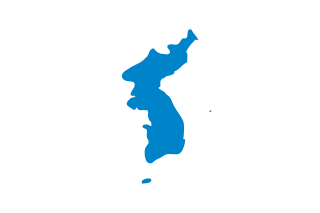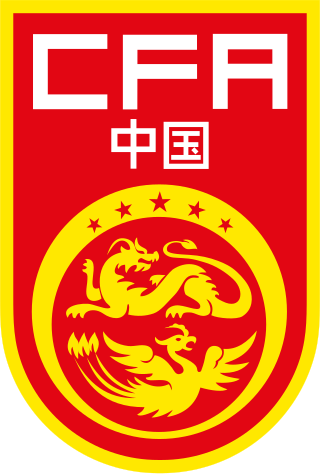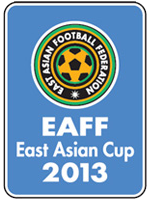
Korea is a peninsular region in East Asia. Since 1945, it has been divided at or near the 38th parallel, now known as the Korean Demilitarized Zone. In 1948, two states declared independence, both claiming sovereignty over all of Korea: South Korea comprising its southern half and North Korea comprising its northern half. The region consists of the Korean Peninsula, Jeju Island, and a number of minor islands near the peninsula. The peninsula is bordered by China (Manchuria) to the north and Russia to the northeast, across the Amnok and Duman rivers. It is separated from Japan to the southeast by the Korea Strait.

The 2002 FIFA World Cup, also branded as Korea Japan 2002, was the 17th FIFA World Cup, the quadrennial football world championship for men's national teams organized by FIFA. It was held from 31 May to 30 June 2002 at sites in South Korea and Japan, with its final match hosted by Japan at International Stadium in Yokohama.

The AFC Asian Cup is the primary association football competition contested by the senior men's national teams of the members of the Asian Football Confederation (AFC), determining the continental champion of Asia. It is the second oldest continental football championship in the world after Copa América. The winning team becomes the champion of Asia and until 2015 qualified for the FIFA Confederations Cup.

Hong Myung-bo is a South Korean former footballer who played as a sweeper, and the current head coach of Ulsan Hyundai. Hong is often considered one of the greatest Asian footballers of all time.

The China national football team represents the People's Republic of China in international association football and is governed by the Chinese Football Association.

The Japan national football team, nicknamed the "Samurai Blue", represents Japan in men's international football. It is controlled by the Japan Football Association (JFA), the governing body for football in Japan.

The South Korea national football team represents South Korea in men's international football and is governed by the Korea Football Association. South Korea has emerged as a major football power in Asia since the 1980s, having participated in ten consecutive and eleven overall FIFA World Cup tournaments, the most for any Asian country. Despite initially going through five World Cup tournaments without winning a match, South Korea became the first Asian team to reach the semi-finals when they co-hosted the 2002 tournament with Japan. South Korea also won two AFC Asian Cup titles, and finished as runners-up on four occasions. Furthermore, the team won three gold medals and three silver medals at the senior Asian Games.

The North Korea national football team represents North Korea in men's international football and it is controlled by the DPR Korea Football Association, the governing body for Football in North Korea. The team represents both FIFA and Asian Football Confederation (AFC).

Seo Jung-won is a South Korean football manager and former player, currently in charge of Chengdu Rongcheng.

Hwang Sun-hong is a South Korean former football player and current manager of the South Korea national under-23 football team. He was the most notable South Korean striker in the 1990s and early 2000s.
Kim Joo-sung is a former South Korean football player. Kim is regarded as one of the greatest Asian footballers of the 20th century. He was nominated for the IFFHS Asia's Player of the Century, finishing second place.
Gu Sang-bum is a former South Korean football player who played as a left-back. He played for the South Korea national football team in 1990 and 1994 FIFA World Cup.

The South Korea women's national football team represents South Korea in international women's football competitions. The South Korean women's team has qualified for four FIFA World Cups in 2003, 2015, 2019 and 2023.
Hwangbo Kwan is a South Korean football manager and former player. He is famous for his long-range goal against Spain in the 1990 FIFA World Cup.

Choi Soon-ho is a South Korean football manager and former player.

Lee Young-jin is a South Korean football manager and former player. He mostly played for Lucky-Goldstar Hwangso.
The 1992 Dynasty Cup was a football competition for the top four teams of East Asia. The second edition of the Dynasty Cup was held from 22 to 29 August 1992 in China. The competition was won by Japan.

This article is about matches between North Korean and South Korean national football teams.

The 2013 EAFF East Asian Cup was the 5th edition of this regional competition, the football championship of East Asia. Two preliminary competitions were held during 2012. Mongolia were suspended from the EAFF and could not compete in any EAFF competition until March 2014, whilst Australia accepted an invitation to take part.
Events from the year 1990 in South Korea.













